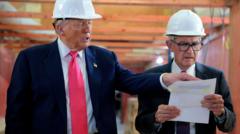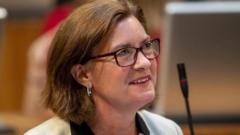Could Trump's Clash with the Fed Shake the US Economy?

Published: 2025-08-26 16:30:34 | Category: technology
The recent announcement by Donald Trump regarding the dismissal of Federal Reserve governor Lisa Cook has sparked significant debate about the independence of America's central bank. Cook insists she will not resign and is considering legal action, raising the possibility of a high-profile legal battle that could reach the US Supreme Court. This unusual situation highlights ongoing tensions between presidential authority and the autonomy of the Federal Reserve, a crucial institution that has maintained its independence since its establishment in 1913.
Last updated: 05 October 2023 (BST)
Key Takeaways
- Trump's attempt to remove Lisa Cook raises questions about the independence of the Federal Reserve.
- Cook is threatening legal action, potentially leading to a Supreme Court case.
- Presidential influence over the Fed is not new, but Trump's approach is particularly aggressive.
- The Fed's independence is critical for maintaining economic stability.
- Market reactions indicate a cautious approach to Trump's threats, but uncertainty remains.
The Role of the Federal Reserve
The Federal Reserve, often referred to simply as "the Fed," was established in 1913 and plays a pivotal role in the US economy. It has two primary objectives: to maintain price stability and to promote maximum employment. These dual mandates are critical for ensuring a healthy economy where inflation is controlled and job opportunities are available for the American workforce.
The Independence of the Federal Reserve
A defining characteristic of the Federal Reserve is its independence from political influence. This means that the Fed can make decisions regarding interest rates and monetary policy without direct interference from Congress or the president. This independence is essential, especially during times of economic uncertainty when political pressures might lead to decisions that could harm long-term economic stability.
Political Pressure and Its Implications
In recent months, President Trump has intensified his criticisms of the Federal Reserve, particularly targeting Chair Jay Powell. Trump's frustrations stem from the Fed's reluctance to cut interest rates, which he believes would stimulate the economy and make borrowing more affordable for the government. Such political interference raises significant concerns among economists and market analysts about the potential consequences for the economy.
Historical Context of Presidential Interference
Presidential conflicts with the Federal Reserve are not a new phenomenon. Historical records show that tensions between the White House and the Fed date back several decades. One notable incident occurred during the 1960s when President Lyndon Johnson reportedly confronted the Fed chairman in a physical manner over interest rate decisions. However, what distinguishes the current situation is Trump's overt intention to overhaul the Fed board and appoint individuals aligned with his political views.
Potential Consequences of Trump's Actions
The implications of Trump's threats extend beyond the immediate political landscape. The Federal Reserve's ability to act independently has long been viewed as a cornerstone of economic stability in the US. Economists warn that allowing political agendas to dictate monetary policy can lead to detrimental effects, including rising inflation and market instability.
Risks of Political Interference
While cutting interest rates may provide short-term economic relief, it can also create long-term challenges. As economist Claudia Sahm points out, political leaders may advocate for policies that boost growth in the short run but could lead to increased inflation and economic instability. The risk of creating "boom and bust" cycles is heightened when monetary policy is influenced by political considerations, as evidenced by former Fed Chair Ben Bernanke's warnings in 2010.
The Global Impact of Fed Credibility
The Federal Reserve's credibility is not just a domestic issue; it has far-reaching implications for the global economy. Investors around the world rely on the stability of the Fed and US Treasury bonds as a safe haven for their investments. A loss of confidence in the Fed's independence could lead to increased borrowing costs for the US government, which may have ripple effects across global markets. Since US Treasury yields are often used as benchmarks for setting prices on various assets worldwide, any instability in this area could trigger a broader financial crisis.
Current Market Reactions
Despite Trump's aggressive stance towards the Federal Reserve, financial markets have thus far reacted with relative calm. Investors appear to be taking the situation in their stride; however, this stability could be fragile. As uncertainties surrounding the Fed's future intensify, market confidence could rapidly shift, leading to increased volatility.
The Future of the Federal Reserve
As the situation unfolds, questions remain about the Federal Reserve's future and its ability to maintain its independence. The potential legal battle between Trump and Cook could set significant precedents regarding the authority of the president over the Fed and redefine the boundaries of political influence on monetary policy. The outcome of these developments will significantly impact economic stability and investor confidence in the US and beyond.
Looking Ahead
In conclusion, the ongoing tensions between Donald Trump and the Federal Reserve present a unique challenge for the US economy. As Trump seeks to exert influence over the Fed, the implications of such actions could reshape monetary policy and economic stability for years to come. It remains to be seen how this drama will play out, but the stakes are undeniably high.
FAQs
What is the Federal Reserve?
The Federal Reserve, established in 1913, is the central bank of the United States responsible for managing monetary policy, regulating banks, and maintaining financial stability.
Why is the Federal Reserve independent?
The Fed's independence allows it to make decisions regarding interest rates and monetary policy without political interference, which is crucial for maintaining economic stability.
What are the consequences of political interference in monetary policy?
Political interference can lead to increased inflation, market instability, and economic cycles that may harm long-term growth, as short-term political goals often conflict with sound economic policy.
How does the Fed impact the global economy?
The Fed's policies and decisions influence global financial markets, as US Treasury bonds are considered a safe investment. Changes in Fed credibility can affect borrowing costs and market stability worldwide.
What could happen if Trump successfully removes Federal Reserve governor Lisa Cook?
If Trump removes Cook, it could set a precedent for presidential influence over the Fed, potentially undermining its independence and raising concerns about future monetary policy decisions.



